Yesterday in the Hong Kong stock market, the Mainland car manufacturer Geely Automobile Holdings Limited (00175.HK) at one point hit intraday high of 11.24 HK dollars per share, pushing the market capitalization of the company to approximately 100 billion HK dollars. Compared with the middle of last February, the price of the company has surged over 300 percent. The reason for the soaring price is the rising of China’s domestic auto brands represented by Geely Automobile.
In January, the sales volume of Geely Automobile increased by over 70 percent year on year, despite China’s passenger car market overall recorded slight decline year on year. Other domestic brands under Shanghai Automotive Industry Corporation (Group) (SAIC) and Guangzhou Automotive Group (GAC) also witnessed an increase in sales of about 60 percent. In this regard, senior executive of a domestic brand car manufacturer pointed out that domestic brands know Chinese consumers better than foreign or joint venture auto brands, and they can usually response quickly toward the change of market conditions. China’s domestic auto brands have the advantage of high quality and low prices in the competition with foreign and joint venture brands. With the expansion of domestic brands, competition landscape of the whole auto industry in China also changed. Components and parts manufacturers for engine and instrument panel thus obtained greater growth space.
Sales volume of domestic auto brands surge in January despite of market downturn
Though the auto market slowed down in this January, sales volume of the leading domestic brands still saw high growth. In January, Geely Automobile has sold about 102,653 vehicles, increasing by 71 percent year on year; GAC Motor, the domestic auto brand platform under GAC, has sold 46,273 vehicles in January, up by 58.66 percent year on year; SAIC Motor Passenger Vehicle Company has sold 46,268 vehicles in January, rising by 71.02 percent year on year. In contrast, the latest data from China Automotive Industry Association (CAIA) shows that auto sales volume in the domestic market in January was 2.52 million, a slight increase of 0.2 percent; the monthly sales volume of passenger car was 2.218 million, edging down by 1.1 percent.
Outsiders started to pay close attention to the amazing growth of China’s domestic auto brands only recently. But earlier in 2016, domestic auto brands have entered the “fast track” of development. Circumstances such as popular car models and short of supply which were only seen in luxury import auto brands in the past, started to appear in domestic brands. Domestic brands such as Roewe RX5 of SAIC and Borui of Geely Automobile are all very popular domestic brands. In this backdrop, China’s domestic auto brands began to reverse the disadvantageous position and plan to realize rapid development in 2017.
“Geely Automobile hopes to ascent to the club with annual sales volume of million cars. The planned sales volume is 1 million yuan for the whole year of 2017, with an increase of 30 percent,” says Lin Jie, vice president and general manager of the sales company of Geely Automobile told the Shanghai Securities News. In 2016, the total sales volume of Geely Automobile throughout the year was 760,000 cars, increasing by 50 percent and outperformed the annual sales target of 700,000 cars, a number determined after revising upwardly twice. Geely Automobile previously announced that the company’s net profit growth in 2016 was expected to increase by more than 100 percent. The company’s net profit for 2015 was 2.26 billion yuan.
Coincidently, a senior executive of GAC Motor also told the journalist that the company will launch 9 new car models in 2017, to challenge the goal of producing and selling 500,000 cars. In 2016, GAC Motor in total sold 370,000 cars, increasing by 90.66 percent year on year. The journalist learnt that since 2016, GAC Motor’s contribution to the performance of GAC has surpassed joint venture brands such as Guangqi Toyota Automobile and Guangqi Honda Automobile.
Another leading car manufacturer SAIC Motor Passenger Vehicle Company also realized profit for the first time in 2016 since its establishment. The journalist exclusively learnt that in 2017, SAIC Motor Passenger Vehicle Company’s sales target is to try to keep the sales volume of 500,000 cars and strive to achieve sales of 600,000 cars. At the beginning of 2016, SAIC Motor set the sales target of 240,000 cars. But it turned out that the whole year sales volume reached 320,000 cars, well above the target.
As for the aggressive goal of SAIC Motor Passenger Vehicle Company, outsiders concerned that the company may fail in the end in light of the slowdown of the whole domestic car market. However, Yu Jingmin, vice manager of the company, is confident. “China’s auto market has entered the period with steady growth. In order to achieve higher growth, we have to find out and get hold of the growing sector. This is exactly our ‘secret’ of success in the past. In the second of 2016, we launched a new car model—Roewe RX5, which has proved to be very popular among young people.” It is learnt that SAIC Motor Passenger Vehicle Company hopes to replicate the success of Roewe RX5 on its MG brand. Yesterday, the MG ZS was offered for preselling, with the slogan of “the first essential Internet SUV for young people.”
“Our Roewe RX5 has achieved great success in 2016. The sales volume has increased from 100,000 in 2015 to 240, 000,” says Yu. According to the company’s scheme, the planned sales volume of MG brand in 2017 is 200,000 cars, an increase of 2.4 to 2.5 times (sales volume of MG in 2016 was about 80,000 cars). Besides, SAIC Motor Passenger Vehicle Company will also eye on the opportunity of new energy car market, aiming at a sales volume of 80,000 to 100,000 new energy cars.
Sales target of domestic auto brands in 2017
| Auto Company | Sales Volume in 2016 (10,000 vehicles) | Sales Target in 2017 (10,000 vehicles) |
| Great Wall Automobile | 109.4 | 125 |
| Geely Automobile | 76.6 | 100 |
| Chery Automobile | 58.7 | 90-100 |
| Beijing Automobile Group (domestic brands) | 45.7 | 50 |
| GAC Motor | 37.2 | 50 |
| JAC Motors | 36.7 | 40 |
| SAIC Motor Passenger Vehicle Company | 32.2 | 50-60 |
| Dongfeng Motor Corporation Passenger Vehicle Company | 14.9 | 20 |
| Borgward Group AG | 3 | 15 |
Embrace era of 3.0 with high quality and low prices
Outsiders are both exciting and concerned about the rapid growth of sales volume of domestic auto brands. “Can the growth sustain when joint venture car manufacturers fight back?” As to this question, Yu Jingmin hold optimistic attitude of the strength of domestic auto brands. “Since the second half of 2016, domestic auto brands have entered the era of 3.0. They started to pay great attention to customers’ experience on quality and price,” says Yu, explaining that in the era of 1.0, domestic brands such as Great Wall Automobile and Changan Auto depended more on the advantage of low prices. In the 2.0 era, car manufacturers pay more attention to cost performance, namely the price and configuration advantages. Compared with joint venture brands, domestic brands were quicker in response to customers’ demand on the appearance, configuration and prices. As a result, they soon attracted a group of customers for economical and entry level cars. While entering the 3.0 era, car manufacturers are no longer compete purely on cost performance. Instead, they start to emphasize quality and price, and transfer from “reacting quickly to market demand, avoiding producing car models that also produced by other manufactures and selling similar products at lower prices” to the new phase of “producing better cars at faster speed with more innovation”.
Based on detailed data, the sales growth of proprietary brands in 2016 mainly benefited from two major markets, and besides the upgraded consumption market in rural areas, cities also become “new battleground” of some proprietarily-branded automobile enterprises. After years of struggling and technical accumulation, these enterprises, such as Greely Automobile., SAIC Motor Passenger Vehicle Company and etc., have really carried out fierce competition with those of Korea and Japan. “Around 33 percent of car buyers had bought joint-venture branded cars before, when Greely Boyue was delivered the first wave of vehicles in Tianjin; in addition, white-collar workers and civil servants take up a proportion of 40 percent regarding to consumer types”, Lin said. “In 2016, along with the launch of Greely Boyue, Emgerand EV, Vision SUV and other types, the monthly sales of Greely Automobile in Beijing, Shanghai and Guangzhou broke through 1,000 vehicles, and this company achieved a unprecedented growth in the first and second tier cities”, he also revealed.
Acquiring matured overseas brands and enhancing consumer confidence through after-sale service improvement are also the “corner overtaking” strategy of proprietary brands. Greely Automobile Holdings greatly enhances its competitive power, which is closely linked to that its parent company Greely Group has acquired Swedish automobile enterprise Volvo. Greely Group creates totally new car types based on highly-modularized CMA framework, and makes Volvo and Greely fully share the resources; through this platform, Greely Group will launch new products, including A-class car, B-class car, SUV and etc.; especially, the monthly sales of compact SUV type is expected to reach 10,000 vehicles, and their competitors are the same-class cars from Korea and Japan.
So does Borgward Group under Beiqi Foton Motor Co., Ltd., as the latter has acquired German luxurious car brand Borgward, and launched local Borgward BX7 in 2016. Such type had realized the sales of around 30,000 units in 2016. Last November, Borgward Group started to provide “lifetime warranty for free” service, attracting a large number of consumers. According to this service, “the first owner of BX7 can enjoy lifetime warranty for free, and meanwhile, he/she can also enjoy free roadside assistant service for three years”. In 2017, Borgward Group plans to realize a sales volume of around 150,000 units.
Components industrial chain to see more opportunities
Along with the rising proprietary brands, related components enterprises also see booming prospect. At present, at least 11 A-share automobile components listed companies have announced the growth forecast report, according to journalist’s statistics. Especially, Changchun Yidong Clutch Co., Ltd. (600148.SH) expects that its net profit of last year will increase 1,053 percent roughly; Harbin Dongan Auto Engine Co., Ltd. (600178.SH) predicts a net profit growth of 198.69 to 284.03 percent in 2016, which means 70 to 90 million yuan; Ningbo Tuopu Group Co., Ltd. (601689.SH) announces a growth forecast of 50 to 60 percent for its net profit of 2016, and the figure for 2015 reached 400 million yuan.
Several factors push great growth of automobile components enterprise, and especially, some of them benefit from overall growth of domestic automobile market last year. For example, Yidong Clutch stated, “the automobile market improving with stability is one of the main factor to push high its performance growth, and its promoting comprehensive and lean management with favorable cost & expenditure control is an another one”.
Most of components enterprises mainly benefit from their rising proprietary brands, and in particular, motor, speed-changing box, and other core automobile components suppliers benefit more. Previously, due to high input cost and insufficient R&D strength, many automobile enterprises with proprietary brands were not willing or able to self-produce the said core components. It learnt, the cost to build up a motor factory may be higher than that for finished automobile assembly plant sometimes, and with longer period. Taking Greely Automobile for example, it announced last September that it will start motor project in Taizhou, with an annual capacity of 400,000 units and a total investment of 5.12 billion yuan, and this is estimated to input for production by 2020. Those suppliers having stepping in supporting system, like Dongan Auto Engine, are attractive to proprietary brands, due to cost, scale and other advantages. Although a large number of low emission passenger car orders are received, they cannot be fast transformed to actual sales volume, as the mentioned core components supply faces a bottleneck, journalist learnt from several proprietarily-branded automobile enterprises. As domestic motor supplier producing small emission engines, Dongan Auto Engine had its products extremely hot in 2016. The company once announced that “its motor production and sales remarkably grew in 2016, up 91.48 percent and 101.32 percent compared to those in 2015”. According to the announcement, its headquarter accumulatively sold 309,800 motors in 2016, up 101.32 percent; that for Harbin DongAn Automotive Engine Manufacturing Co., Ltd. was 452,666 units, up 28.85 percent. Especially, the headquarter provides motors for Changan Oushang self-owned by Chongqing Changan Automobile Company Limited (000625.SZ), and Beiqi Weiwang self-owned by BARC Group, with average monthly sales of 20,000 to 30,000 units, and it is almost under full production. Along with constant strength of proprietary brands, Dongan Auto Engine will possibly continue to realize high growth rate in 2017, the market commonly expects.
Furthermore, with the same quality, suppliers having proprietarily-branded car types are easier to enter in supply chain of joint-venture brands, with less time, which will improve the market penetration ratio of domestic automobile components companies.
Great sales of proprietarily-branded cars also promote the market demand for automotive electronics field. Compared to joint-venture brands, the former knows better about young consumers’ demand for electronic products domestically, and more rapidly meets the demand. Among proprietary brands, electronic stability program (ESP) has become standard equipment for SUV, and the market penetration ratio of constant speed cruise, panoramic sunroof, liquid-crystal instrument panel, rearview mirror heater, 360-degree look, and other electronic devices also improves fast. It learnt that proprietarily-branded cars over 100,000 yuan have successively been equipped with liquid-crystal instrument system, such as MG ZS going to launch in the market and Creely Boyue. It greatly enhances the sales of related components suppliers, and Tuopu Group is just one of beneficiaries. This company has attributed its performance growth forecast to that it had gained orders from both joint-venture and proprietarily branded clients in 2016 one by one. Moreover, traditional joint-venture branded clients provided stable revenue for the company, and proprietarily-branded ones contributed to fast growth.
Power battery price down, private funds optimistic on investment opportunities of new energy cars
The production and sales of new energy cars greatly declined year on year in January, and institutions reduced their allocation for new energy car sector to the lowest level. But some private funds in the south were optimistic on opportunities of finished new energy car enterprises introduced by lowering power battery price, and they increased the position of related stocks against the market trend.
They believed that big car companies are fiercely negotiating with battery suppliers regarding to price, but due to overcapacity of power battery, car plants are pressing the price of battery producers now, and the price reduction of power battery is estimated to be a main trend in 2017. As power battery takes up around one thirds of the cost of finished new energy car, the price reduction will improve the profit rate of new energy car.
Automobile’s electronic orientation is a big trend for this industrial development, as electronic car is the best carrier to realize car intelligence and internet-orientation, instead of traditional cars; e-cars better meet the consuming habit of young generation, once the cost reduces to a critical point, the demands for new energy car will explosively grow, the said private fund insider also thought. Such cars’ popularizing pace may be faster than market expectation. In recent China EV100 Forum 2017, Li Shufu, chairman of Greely Automobile Holdings, said frankly that new energy car will account for 90 percent of its produced cars by 2020.
Translated by Adam and Jelly
















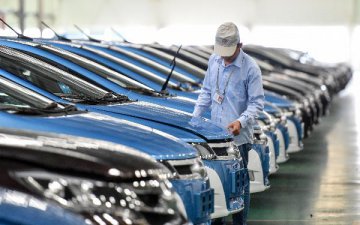
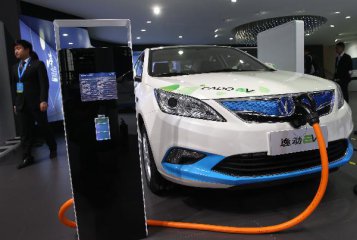
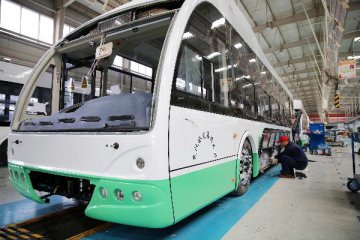
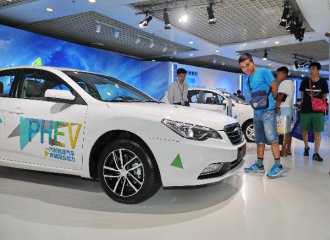

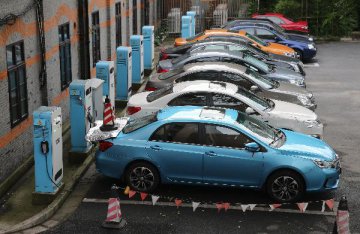


Latest comments